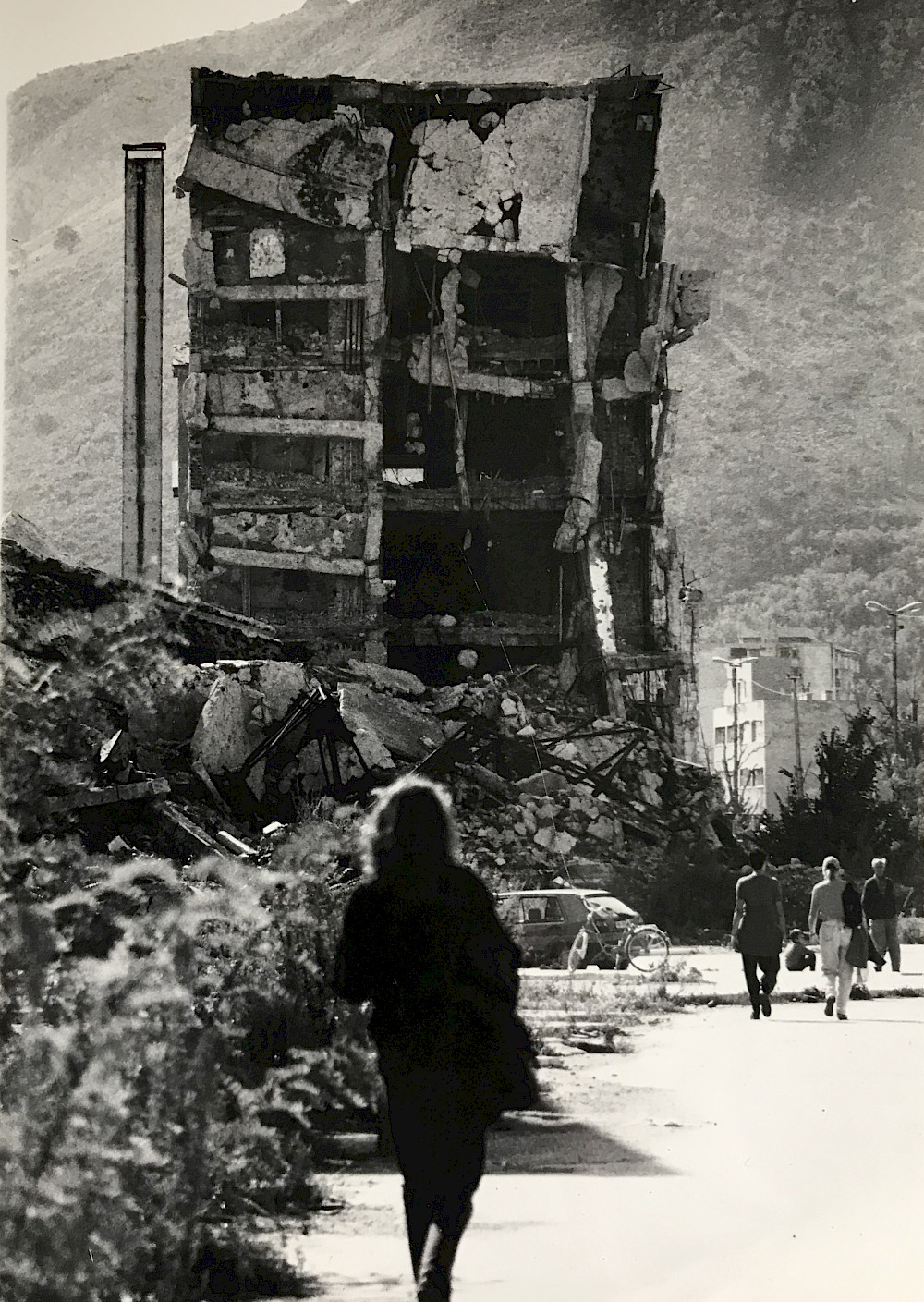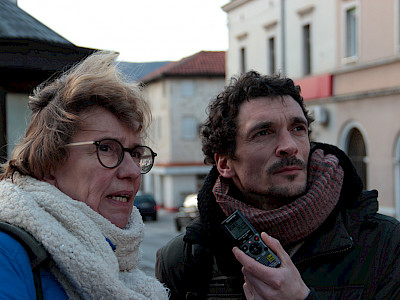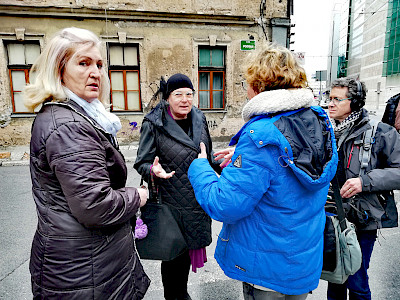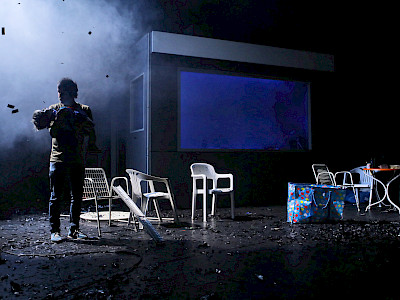10 — 15.05.2022
In the early 1990s, hundreds of journalists from all over the world arrived in Bosnia to report on the war and the siege of Sarajevo. Among them was the Belgian RTBF correspondent Françoise Wallemacq. Twenty five years ago, Sébastien Foucault inspired by her radio-reports back then, creates a captivating theatrical performance about the responsibility of storytelling. For Foucault – who appeared at Kunstenfestivaldesarts previously as an actor for Milo Rau in The Civil Wars and La Reprise – it becomes the starting point for a reflection on the way he has been practising documentary theatre and the limit that exists in setting stories on stage. With the piece constantly shifting between journalism and theatre, on stage we find the journalist, Françoise Wallmacq, but also actress and former Bosnian journalist Vedrana Božinović, who covered the Siege of Sarajevo, and Michel Villée, former press officer for MSF Belgium and now a puppeteer. By mastering different techniques of representation, they use the medium of the theatre to transform old radio reports into artistic objects. Reporters de guerre is a meaningful theatrical performance about narration, its limitations, but also its battle against indifference and oblivion.
Listen to Sebastian Foucault discussing his new creation Reporters de guerre for France Culture, interviewed by Aurélie Charon.
Sébastien Foucault talks about his intention behind Reporters de guerre
Why did you choose to depict war and the war in Bosnia in particular?
Along with the first Gulf war, the war in Bosnia happened just as I was becoming more aware of the world. It was taking place not very far away from us at all, on European soil, when we thought we were done with wars. It had a profound impact on the war reporters I met and continues to haunt their imaginations long after the peace treaties were signed. At a time when cracks are showing in the European project, when isolationism and hatred are resurfacing, I think it’s relevant to be interested in what happened when the Yugoslav bloc fell apart.
Why are you using, comparing and linking together several performance techniques to show reality?
When I’m in an audience, I like to be told how stories are made as much as be told the (hi)story itself. I think confronting different modes of performance is a subtle, complex and non-didactic way of revealing the principles and techniques behind it. When I met Milo Rau in 2011, he hadn’t yet become one of the “masters” (to his admirers) or one of the “heavyweights” (to his detractors) of documentary-style theatre on the international scene. Our friendship and collaboration are based on shared obsessions, and it’s together, in a form of complicity, that we’ve forged the tools to depict the reality that we’re professing to act on. Over time, his ethical model and aesthetic emerged which occasionally shut down options that had opened up, rejected certain hypotheses and kept certain desires in check. That’s entirely fair and I’ll carry on working with him when the opportunity comes along. But I decided to step aside. In this sense, Reporters de guerre is also a reflection on the documentary theatre that I’ve been doing for a decade. It’s a wonderful opportunity for me to take stock, rediscover what makes me different and open up new ethical and aesthetic perspectives.
What place does war journalism have in the production and what is its significance?
It’s a work of reflection on war journalism, but it’s not a critical work in the sense of being against it or issuing a polemic. We didn’t choose just any kind of journalism or any kind of journalist. There are a thousand ways of doing journalism and just many different kinds of journalistic personalities. For better or worse. For the reflection to be productive, we chose one of our favourite types of media that some of us (on the technical and artistic team) know well: radio, a journalism of investigation and enquiry, a journalism embodied by a professional, Françoise Wallemacq. We really admire her work and embrace her work ethic. We also chose war journalism as the theme here because it’s pretty much interested in the same subject as us: the causes, mechanisms and consequences of violence. Because we share certain aims (describing, enabling people to understand and at best allowing the reality of it to be felt) and, in some cases, certain ethical principles, whether they’re acknowledged (preventing impunity, giving a voice to the voiceless) or unacknowledged (acting on reality). But also because war journalism is based on techniques, values and presuppositions that are radically different from our own (and that we felt are relevant for making a comparison).
Why did you choose Françoise Wallemacq specifically?
What I admire about Françoise Wallemacq’s work is that, like Svetlana Alexievich, she focuses on the fate of “normal” people, the prisoners of this collective and individual tragedy that is their war. Her aim through her reporting is for her listeners to understand and identify with it simultaneously. Her best reports deal with three challenges: covering a specific aspect of a war, revealing its universal nature, and illustrating it simply through one or more specific situations experienced by “ordinary citizens”. These are precisely the reports that have these three qualities (universal, specific, allowing identification) that we chose to include in the show.
Why use puppetry and radio?
Object theatre, and puppetry specifically, is a fantastic way of understanding the living through the intermediary of what isn’t living, a tool for indirectly accessing reality. Death (which is consubstantial with it) is one of its preferred objects and it would be a shame not to use it in the context of an essay on modes of representation of violence and its consequences.
Radio, even more than print journalism, is the medium that has produced the kind of journalism that has affected and touched me the most. And because I agree with what Françoise Wallemacq says when she talks about radio in journalism: “I think that radio is the most intimate… and the most respectful of people too. There’s no camera to devour them. To steal their image. No sensationalism like you get on TV or the internet. The worst in a report, the strongest sound I can use, is the sound of someone crying or shouting out their despair. I can’t go further than that. But I think that sometimes it’s more moving to hear someone crying than to see their image.”
Presentation: Kunstenfestivaldesarts, Théâtre Les Tanneurs
Direction: Sébastien Foucault | Texts: Sébastien Foucault, Julie Remacle, with the actors | With: Françoise Wallemacq, Vedrana Božinović, Michel Villée | Dramaturgy: Julie Remacle | Researches: Sébastien Foucault, Françoise Wallemacq, Vedrana Božinović, Nikša Kušelj, Michel Villée, Mascha Euchner-Martinez, Mirna Rustemovic, Nikša Kušelj | Assistant: Jeanne Berger | Production manager: Mascha Euchner-Martinez | Scenography: Anton Lukas | Lights: Caspar Langhoff | Sounds: Kevin Alf Jaspar | Stage manager, video: Jens Baudisch | Technician: Olivier Arnoldy | Creation puppets: Loïc Nebreda | Set building: Sandra Belloi, Cédric Debatty | Infography: Julien Hubert | Documentary research: Christine Foucault | Translation: Boris Radović, Leila Putcuyps | Surtitles and translation: Babel Subtitling
Production: Que Faire ? Asbl, Théâtre de Liège and DC&J Création | Coproduction: Kunstenfestivaldesarts, Tandem Arras-Douai (France), Théâtre Les Tanneurs, NTGent | With the support of: Théâtre & Publics, IIPM, Théâtre National de Zagreb (Croatia), Tax Shelter of the Belgian Federal Government, Inver Tax Shelter, RTBF | With the help of: Ministère de la Fédération Wallonie Bruxelles – Service Théâtre & Démocratie ou Barbarie (Décret-mémoire)




